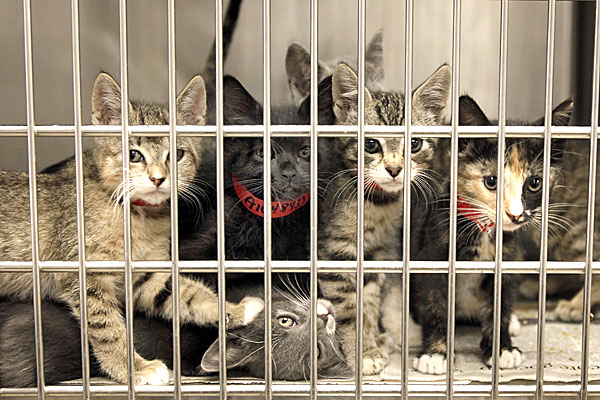Shelter Statistics or Why the Odds of Finding Your Lost Pet at a Shelter are Against You
CONVENTIONAL WISDOM: Most lost pets are reunited through a shelter.
REALITY CHECK: Relatively few strays are reclaimed before being euthanized or adopted out to others.
What is the recovery rate for stray dogs in shelters?

According to the ASPCA “About twice as many animals enter shelters as strays compared to the number that are relinquished by their owners. [2/3 vs. 1/3]” But only 17-30% of dogs are ever reclaimed by their owner. (See the ASPCA's page on Shelter Statistics)
What is the recovery rate for stray cats in shelters?

For cats the stats are truly appalling – only 2 – 5% of cats ever get reclaimed.
(See The Humane Society of the United States site ) In major metropolitan areas like Columbus, OH, for example, the numbers may even be worse. Of the 6,000+ cats taken in by Franklin County's only open admission shelter in calendar year 2014, only 27 were successfully reunited and half of those only because they had a microchip.
Why is the recovery rate so low?
Given the odds against people getting to the shelter during that very small window of time when their pet might still be there, it is little wonder that the recovery rate is so low. Dogs have a better chance because they get picked up sooner and most states have laws requiring a minimum holding period for dogs. It may only be a few days or weeks for dogs, but in most states there is no mandated holding period for cats. In “kitten season” it is not unusual for a cat turned in to a shelter to be euthanized the same day. There is simply no holding space in adoption wards already full of more adoptable kittens.
What can be done to help people recover their lost pets in shelters?
If there were a generally accepted protocol for shelters of posting all strays to a public database it would save a lot of lives. This would spare people the trouble of having to get to one or more shelters almost every day when often the shelters are located on the other side of town and are only open at certain hours. Many sensitive people dread going to shelters and having to look at all those little faces knowing many if them are doomed.
Why Don't Shelters Post Their Lost Pet Intakes?
Few shelters take advantage of available recent technology to post their intakes. Some shelter management software products have a module that facilitates posting lost pet intakes to the net, but they are usually very expensive and far out of reach for private humane societies. Fortunately, there are some free public databases that any shelter could use, including PetFBI.org. Which is strictly non-commercial and absolutely free, but there is a reluctance on the part of shelters to post stray intakes. The reason given is that they don't want to invite “shopping”. Apparently there are people with dishonest motives who will claim a purebred dog, for example, with the intention of re-selling it. Or they will claim a breed of dog perceived as a “fighting” breed with the intention of fighting it. (Dog fighting is a cruel “sport” that is much more widespread than imagined.) But I find it hard to accept this reason as an obstacle to not posting strays. Surely, the benefits greatly outweigh the risks and people who claim an impounded animal have to pay a redemption fee. It is unlikely the same person would claim a pet fraudulently more than once.
How would posting lost pets to a public database help shelters?
A necessary condition of course would be that people know they can look online without having to call or come to the shelter. It would still be necessary to come in whenever there is a likely match, but people would be less likely to give up too soon. This would also ease things for shelters. If more of their "stray" intakes were reclaimed, it would lower their euthanasia rate, increase their adoption rate, and save them the trouble of dealing with repeated phone calls and visitors needing to go through the holding areas. Of course, there will always be some cases where it is absolutely necessary to go to the shelter (s). Many lost pets look so much alike.
Why Is There No Single Central Database?
Just as there is a national database for stolen cars, ideally, there would be one central database for lost and found pets. But realistically, this will never happen. There are multiple lost and found pet sites and most of them are for profit. Some offer useful contact services, like postcard mailings to many neighbors. Others offer services of dubious value like robo-calling or contacting shelters (You need to GO there in person!). Unfortunately a number of the online lost and found pet services are really just out to make a quick buck by exploiting people's desperation. (This is possibly another factor why shelters are wary of online lost and found pet databases.)
What is a good resource for people who have lost or found a pet and for shelters?
In 1998, Pet FBI was set up as a public database for individuals and shelters to use. Over the past 17 years it has evolved into the best designed and easiest to use public database online, strictly non-commercial and free. Pet families and Good Samaritans can readily connect before the stray needs to be turned into the shelter. There are many people who are hesitant to take a stray to the shelter because of the risks for the animal. Yet, the shelter is the obvious place a pet owner would look for their lost pet so shelters should have someone dedicated to searching reports of lost pets online. There are numerous sources of information besides the various databases. There are Facebook pages, Craigslist and newspaper classifieds. Even Twitter and Instagram are possible sources of information. Unfortunately, with the current state of affairs, anyone who has lost or found a pet needs to turn over many stones.
However, our experience with Pet FBI has shown that by achieving a critical mass of users reunion rates in excess of 35% for cats and 50% for dogs can be achieved. This is our documented success rate in Ohio where we have been helping people recover lost pets since 1998. In May of 2014 we overhauled the Pet FBI web site and database to service the entire United States and Puerto Rico. Already we have the largest database of lost and found pets anywhere online. (Just do a random comparative search!) Our national success rate is about 20% and growing steadily. In addition to the database we have comprehensive advice and contact information for other reliable resources. There is a great new feature: Once you post a report you will automatically be notified of any new potentially matching reports for 90 days. This system of automatic alerts is unique to Pet FBI.
Please help us save lives and by urging your local shelter to take advantage of this free resource. If they don't want to use the Pet FBI database to post intakes, they should at least refer individuals to it.
More users = more happy reunions!